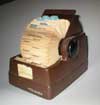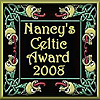| |

Traditions, folklore, history and more. If it's Irish, it's here. Or will be!
"People will not look forward to posterity who never look backward to their ancestors."
-Edmund Burke




Quotes
Library: Books, Movies, Music
Prints & Photos
Poetry
Jokes


Shops Ireland
Bunús na Gaeilge
(Basic Irish)
Circle of Prayer
Blessings
Did You Know?
Himself/Herself
Write to Us
Readers Write..
Links/Link to Us
Advertise with us
Awards & Testimonials
Submissions Guide


|
|
|
Many Years Ago
Edited and condensed by Bridget Haggerty from a John B. Keane story
 Many years ago, in our street, there lived an old woman who had but one son. His name was Jack. Jack's father had died when his son was no more than a gorsoon, so Jack's mother had to go to work to support her son and herself. Many years ago, in our street, there lived an old woman who had but one son. His name was Jack. Jack's father had died when his son was no more than a gorsoon, so Jack's mother had to go to work to support her son and herself.
As Jack grew older, she still went out to work for the simple reason that Jack did not like work. The people in the street used to say that Jack was good for three things. He was good for eating, he was good for smoking, and he was good for drinking. He was also good for leaving. When his mother was too old to work, Jack left for England.
Years passed, but the old woman never had a line from her only son. Every Christmas she would stand inside her window waiting for a card or letter. She waited in vain.
Now it happened that in our street there was a postman who knew a lot more about his residents than they knew about themselves. When Christmas came he was weighted with bags of letters and parcels. People waited his arrival the way children awaited a bishop on confirmation day. He was not averse to indulging in a drop of the comforts wherever such comforts were tendered but comforts or no comforts the man was always sensitive to the need of others. In his heart resided the spirit of Christmas. Whenever he came to the house where the old woman lived he would crawl on all fours past the window. He just didn't have the heart to go by and be seen by her. He hated to disappoint people, particularly old people. For the whole week before Christmas she would take up her position behind the curtains, waiting for the letter which never came.
Finally the postman could bear it no longer. On Christmas Eve he delivered to our house a mixed bunch of cards and letters. Some were from England. He requested one of these envelopes when its contents were removed. He re-wrote the name and address and also wrote a short note which he signed "your loving son Jack." Then from his pocket he extracted a ten shilling note, a considerable sum in those far off days. He placed the note in the envelope. There was no fear the old woman would notice the handwriting because if Jack was good at some things, he was not good at other things at all, and one of these was writing. In fact, Jack could not write his own name.
When the postman came to the old woman's door, he knocked loudly. When she appeared, he put on his best official voice and said "sign for this if you please Missus." The old woman signed and opened the envelope. The tears appeared in her eyes and she cried out loud: "I declare to God but Jack is a scholar." "True for you," said the postman, "and I daresay he couldn't get in touch with you until he learned to write." "I always knew there was good in him," she said, "I always knew it." "There's good in everyone Missus," said the postman, as he moved on to the next house.
The street was not slow in getting the message and in the next and last post there were many parcels for the old woman. It was probably the best Christmas the street ever had.
 ED NOTE: John B. Keane was one of Ireland's most prolific literary figures. A playwright, poet, novelist, essayist and ballad writer, many will say that there's not a home in Ireland without a John B. Keane book. ED NOTE: John B. Keane was one of Ireland's most prolific literary figures. A playwright, poet, novelist, essayist and ballad writer, many will say that there's not a home in Ireland without a John B. Keane book.
A Kerryman, he was born in Listowel in 1928. His massive volume of work includes 18 plays and 32 works of prose and poetry. His death on May 30th 2002 was mourned at home and abroad. He will be greatly missed.
Resource: The full version of this story can be found in the book Christmas in Ireland which includes the works of many other leading Irish writers.
Image: Art Print from All Posters -Waiting For Mail by Louis Cantillo
For more of our Holiday Stories click on the following links.
Advent/Christmas Holidays
Time at this Point in the Year
An Advent Memory
Yes, Kelsey and Maddie, there is a Santa Claus
Waiting for St. Nicholas
Christmas - Ireland's Most Wanted Gifts, 2002
Christmas - Preparing the Puddings
Christmas - Food for the Feast
An Irish Christmas - Then & Now
An Irish Christmas - The Day Before
Memories of Christmas Eve Past
An Irish Christmas - Ding Dong Merrily On High
Seasons Greetings in Irish
St. Stephen's Day to New Year's Eve
New Year's Day to Epiphany
Many Years Ago by John B. Keane
Rowing to Christmas Mass
Burying the Baby Jesus
White Washed Walls
An East Cork Christmas
|
|
Fri, Sep 27, 2024
 The Galway Hooker The Galway Hooker
This unique vessel, with its distinctive curved lines and bright red sails, originated in the village of Claddagh. During the 19th century, hookers supported a significant fishing industry and also carried goods, livestock and fuel. Seán Rainey is remembered for building the last of the original boats, the Truelight, for Martin Oliver who was to become the last king of the Claddagh; as king, he was entitled to white sails on his boat. Since the mid seventies, many of the old sailing craft which were on the verge of extinction have been lovingly restored and new ones have been built. During the summer months they can be seen at festivals such a Cruinniú na mBád - the Gathering of the Boats - in Kinvara.
Click for More Culture Corner.
"For almost twenty-five years, all my Christmases were dominated by the sea that flowed between the island of Inis Mór and the mainland. No matter how early the Christmas fare was ordered on the mainland, there were certain things that could only come on the boat that sailed on Christmas Eve." Brendan Ó hEithir - Christmas Time.
Celebrated Irish writers, including John B. Keane, Seamus Heaney, Eamon Kelly and Brendan Kennelly, remember Christmas past in this special collection of 25 stories, reminiscences and poems.
Click for Christmas in Ireland.
|
|
|




 The Galway Hooker
The Galway Hooker